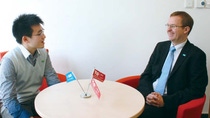“Open mindset” key to future growth
A fresh Grow sits down with a BASF Vice President to find out the company’s expectations of new recruits and the type of mindset young employees must possess and develop to further drive their career.


Shen: You’ve been with BASF for more than 10 years. How did you adapt to the working environment at the beginning of your career here and how can Grow trainees smoothly transit from students to professionals?
Dr. Lars Reichmann: At the very beginning, I was quite surprised how big the company is, really with a lot of people here and many specialized departments. The big challenge was not to find some experience or some knowledge in the company because we always have it, but to find the right person immediately. Once you found the person, they are always willing to share some information with you. That was quite interesting for me to see how much knowledge we have and how we use this knowledge for the company and how much you can also learn in the company.
Life at university and corporate are different. In university it’s very much about learning things, while in the company it’s more about applying your knowledge. Of course, internships help a lot, so that you can really be prepared from the day you enter the company.
How does BASF pick its talents? What’s the focus, academic degree or capability?
For me the most important thing is an open mindset. That means your degree and specialization is kind of prerequisite. Working at BASF is very much about applying your knowledge, about facing challenges, about coming up with innovative ideas, and about taking ownership to find solutions. You can learn more tools or techniques. But the most important thing is that you are open to apply these skills and to collaborate with other people. We need to find those talents who want to do that, who want to work in an international team, and who want to shape the future together with BASF.
How does BASF support learning and development of the employees?
It’s not only for the new beginners, but we really try to have some training offered throughout the whole career. We want to emphasize “life-long learning”. During work, we should learn from job as well as from classes. BASF’s Employee Development Program encompasses a series of integrated career advancement initiatives aimed at optimizing the company’s learning and career system. We have the annual employee dialogue for every employee where your supervisor talks to you about learning needs and opportunities. We implemented the so- called 70-20-10 rule. People realize usually 70% of their learning is on the job, 20% through interaction with others and 10% from classroom training. We want to really apply those tools throughout the career. It is never too old to learn, even if you are near retirement, there still should be some learning.
What are the most-needed skills for Grows in the early stage of our careers? Can BASF provide relevant training?
BASF’s success really depends on people with different backgrounds and expertise – engineers, chemists, business people as well as Chinese, Germans, Americans and other nationalities. I remember when I started at BASF, I learned that it was really different to discuss with somebody with a business administration background, with an engineer, or with a scientist, because sometimes they speak a little bit different languages and think differently. It is quite interesting working with these different kinds of people. It’s a very important skill, because people really bring different knowledge and their different strengths together to create value at BASF.
Training can provide some basics. For example you need some presentation skills and know how to prepare power point presentation; some language skills from language training. However, it is everyday feedback from your supervisor and colleagues that helps most to improve your overall skills and capabilities.
Do you have any expectations from Grow trainees?
Be open. Be curious. Develop your own ideas on how things should be. There are a lot of things to experience in the company. Find your way and try to get the support from others. You will not always have the perfect job each time. But if you look at the big picture and know where you want to go, there are a lot of opportunities. Being able to work with these different people and to embrace diversity is an important competency.